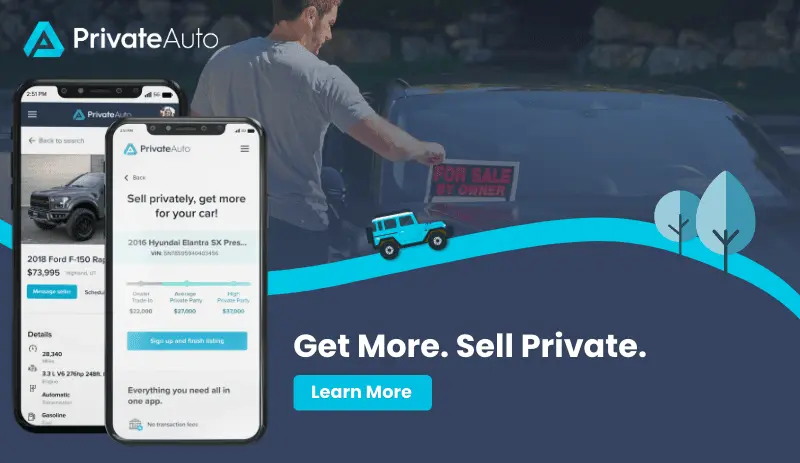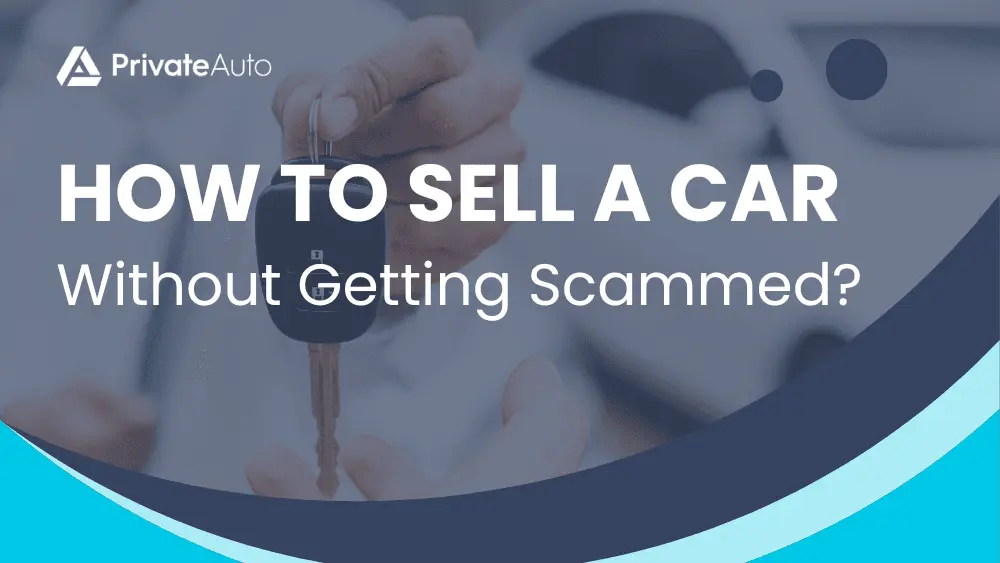We’ll also show you an awesome technology solution that lets you sell your car safely, conveniently, and quickly.
Use trusted platform
Only Use Trusted Platforms
You’ll need to list your car on one or more marketplaces that will attract potential buyers. To avoid getting scammed, look for a platform that fits the following criteria:
- Self-serve technology gives you convenience and security
- An intuitive deal flow takes you through every step of selling your vehicle
- In-app messaging and scheduling keep your personal information private
- An integrated payment gateway lets you receive large sums of money instantly and fee-free
In other words, you want a fully transactional online marketplace that gives you end-to-end tools to get the deal done and keep you safe. PrivateAuto is the only platform that fits the bill. List your car for sale today to connect with prospective buyers.
PrivateAuto is the most user-friendly place to sell your car, but we don’t hate other listing sites. Some of them have terrific reach. The problem is, that they don’t give you the tools you need to get the deal done. That’s why we created DealNow.
DealNow allows you to use PrivateAuto’s transactional technology, even if you’ve met your buyer on another site, such as Facebook Marketplace, CarGurus, or Craigslist.
Here’s how it works:
1. Invite the buyer to DealNow via a custom link.
2. Enjoy identity verification, in-app messaging, and a test drive scheduling feature (none of which require you to exchange contact info).
3. Meet the buyer and let the buyer drive your car.
4. You and the buyer go together through a step-by-step transaction process in which you each confirm relevant details right in the PrivateAuto mobile app. From mileage to the VIN to the condition of the vehicle, we help you both prevent any errors.
5. You and the buyer each electronically sign an official bill of sale. The buyer gets confirmation that you have signed and that they are safe to pay for the car since the bill of sale is a legally binding document. Both you and the buyer have a copy of the signed bill of sale stored in your PrivateAuto account for reference.
6. The buyer is prompted to initiate payment via our integrated banking gateway, PrivateAuto Pay.
7. You get the money instantly in your PrivateAuto Pay account and confirm receipt of payment.
8. You sign over the car title and hand over the keys.
DealNow is so safe, and so fast that you’ll never want to sell a car without it. No matter where you find your buyer—from eBay Motors to Autotrader to the friend of a friend—DealNow will help you get the deal done and get paid, right now.
Bottom line: list your car wherever you like (including PrivateAuto), then use PrivateAuto’s tech to close the deal. You’ll have buyers pouring in, and PrivateAuto’s handy dashboard will help you screen them all, arrange the test drive, and get paid. It’s the safest way to sell your car.

Avoid fake escrow services
Don’t Get Talked into Using Escrow Services
Some fraudulent buyers will insist on using a fake escrow service to scam you. They may even create a convincing escrow site.
You agree on a price, and the buyer claims to fund the escrow service. You may even see proof that the escrow company is holding the money—but the funds are still in the fraudster’s control. After you sign over the car and give them the keys, they take off. Then the fake check bounces, and the scammer and their money are long gone.
Don’t get duped by escrow scams. Choose a reputable escrow service yourself, rather than letting the buyer suggest one. Better yet, just invite the buyer to use DealNow and use PrivateAuto’s secure instant payment solution, PrivateAuto Pay.
PrivateAuto Pay gives you escrow-like safeguards in the palm of your hand, so you can sell your car conveniently, securely, and inexpensively.
Meet in a safe place
Meet in a ‘Safe Zone’
Other sites force you to exchange contact info with a stranger to schedule the test drive. It’s time for a safer way.
Our handy in-app scheduler allows you and the buyer to conveniently arrange the ideal time and public meetup spot.
1. You choose the location and specify some available time slots.
2. The buyer selects from your available time slots and schedules the test drive, with no input needed from you.
3. You meet up and get the deal done.
You control the entire process securely through your PrivateAuto dashboard. You can opt to deal with only legitimate buyers, so you can feel confident meeting them for a test drive.
Most Common Scams Targeting Sellers
While many scams target buyers, private sellers are also vulnerable to fraudulent activity. Scammers are constantly evolving their tactics to take advantage of unsuspecting sellers.
Here are some common scams that sellers should be aware of when using platforms such as Craigslist, Facebook Marketplace, or eBay Motors:
1. Counterfeit payment scam
2. Fake PayPal scam
3. Overpayment scams
4. Phishing scams
5. Stolen credit card scam
Counterfeit payment scam
One: Counterfeit Payment Scam
Fake paypal scam
Two: Fake PayPal Payment Scam
PayPal is a popular way of getting paid, but scammers have figured out how to fake a payment. They mimic PayPal confirmations to dupe sellers.
Real PayPal emails use your full name and don’t ask for personal info. Always log in to verify payments directly.
Stay vigilant for fake PayPal emails. Better yet, skip PayPal entirely and use DealNow for protection.
Overpayment scams
Three: Overpayment Schemes
This trick starts with the buyer sending a cashier’s check for more than the agreed-upon sale price. For example, you are selling a Jeep Gladiator for $40,000, and they give you a check for $45,000.
The scammer will plead with you to refund the $5,000 overage back to them right away, often claiming it was an innocent mistake. They may spin an elaborate story to convince you.
But a few days later, that cashier’s check will bounce when the bank discovers it’s a counterfeit check. Even though you initially deposited the full $45,000, the bank will pull all those funds back out of your account.
You’ll owe the bank $45,000, while the scammer pockets the $5,000 cash you refunded them. Never accept a check for more than the final agreed sale amount. Insist that any overpayments get corrected on their end.
Phishing scams
Four: Phishing Scams
Phishing scams are some of the most common scams on eBay and Craigslist. A phishing scam starts with a supposed buyer contacting you about a listing. They request sensitive information such as the following:
- Bank account or routing numbers
- Credit card details
- Copy of driver’s license
- Social security number
They make seemingly legitimate excuses about needing these details when in reality, they’re stealing your data.
Trust your instincts—and use DealNow.
Stolen credit card scam
Five: Stolen Credit Card Scam
Scammers use stolen cards to buy items, leaving sellers without money and a car.
A supposed buyer purchases your item with a stolen credit card. The payment seems to go through successfully at first.
But soon the card owner sees the unauthorized charge and reports it. The payment then gets reversed. You’re left empty-handed.

What is the safest way to get paid?
What is The Safest Way of Accepting a Payment as a Seller?
Most private sellers don’t think about safe payment methods until it is time to get paid. The reality is that there are no good ways of transferring large sums of money between strangers. Existing payment methods are risky, inconvenient, expensive, or some combination of these.
- Cash: inconvenient and risky
- Check: inconvenient, slow, and risky
- Bank transfer: inconvenient, risky, and slow, with fees
- Peer-to-peer payment apps like Venmo or Paypal: transaction limits, sometimes fees
PrivateAuto Pay is so easy, so secure, and so convenient that you’ll never do a deal without it.
Selling Your Car FAQ
How does PrivateAuto help me manage offers when I sell my car?
Online listing services can quickly drum up a lot of interest and have your inbox full of offers, information requests, and requests for test drives.
Here are a few ways you can manage multiple offers on PrivateAuto:
– Accept, reject, or counter individual offers.
– Schedule meet-up times.
– Recommend locations and times for test drives.
– Link listings on multiple sites to the PrivateAuto platform.
All of this communication occurs through the PrivateAuto app, rather than your personal email or phone number. You can manage all offers on one handy dashboard.
What are the signs of a fake cashier’s check?
Cashier’s checks include some anti-counterfeiting features. Just like cash, they are designed to be difficult to fake (though that doesn’t stop fraudsters from forging very convincing fakes).
Here are some features to search for if you’ve been given a cashier’s check:
– Legitimate bank name, address, and phone number
– Payee name
– Exact amount for your used vehicle
– Watermark, micro print, or other safety features
Some fraudulent cashier checks use a legitimate national bank name but include a personal phone number, where an individual will attempt to impersonate a bank employee. When in doubt, look up the actual customer service number for the bank printed on the check. You can ask the bank itself for its authenticity.
Unfortunately, just because the money is deposited in your bank doesn’t mean the check is good. Banks are required to have your money available in days, but a well-forged check can take as long as two weeks to be identified. While the bank may attempt to track down the scammer, you’ll be required to pay the bank back for the funds, since they were never truly in your account.
Are wire transfers safe in a private car sale?
Wire transfers work as a payment method when selling your car—sort of. They’re slow, inconvenient, expensive, and they involve some risk on your part. They force you to share sensitive banking details with a stranger, and they’re painfully cumbersome. They are one of the easiest ways to scam private sellers.
How to protect yourself when selling a car privately?
To protect yourself when selling a car privately, we recommend the following practices:
1. Don’t give out your contact information
2. Verify that the buyer has the funds to purchase the vehicle
3. Deal with verified buyers only
4. Receive payment through PrivateAuto Pay
How much should I sell my car for?
Use a guide such as Kelley Blue Book to get an idea of the fair market value (FMV) range for your car.
How you price your car is going to depend on:
– How quickly you want to sell. If you want to get rid of your car quickly, price it in the lower part of the fair market value range.
– What upgrades you’ve added. If you’ve had a better and newer sound system installed, that could increase the car’s value.
– What it costs to sell. If you’ll be spending money on advertising, you want to price your car to recover those costs. Consider all the ways you can sell your car.
– The prices of similar used cars near you. Look at a few car-selling sites and search for your make and model. Limit the search to a 25-mile radius of your zip code. Compare prices from other private sellers (not dealer inventory).
